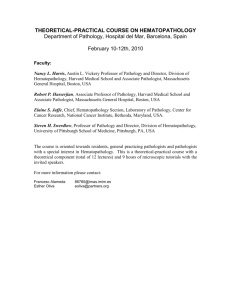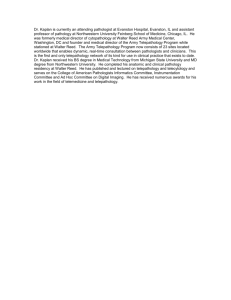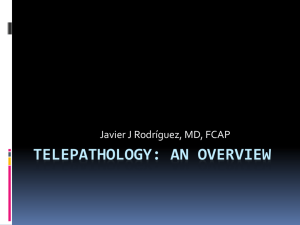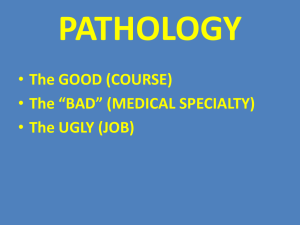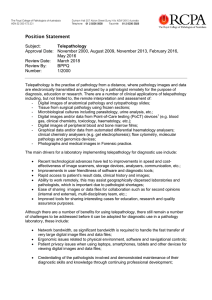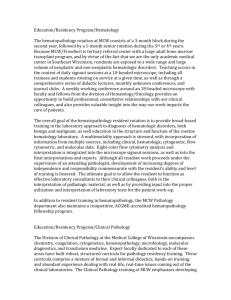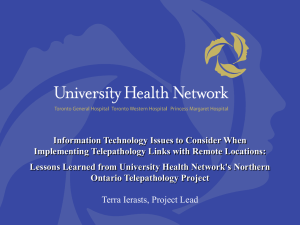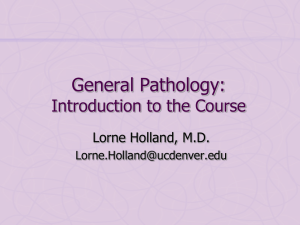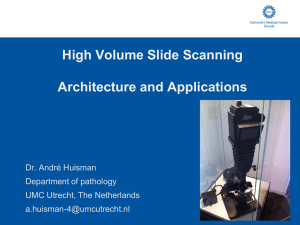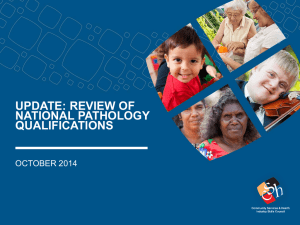Best practices in research collaborations
advertisement
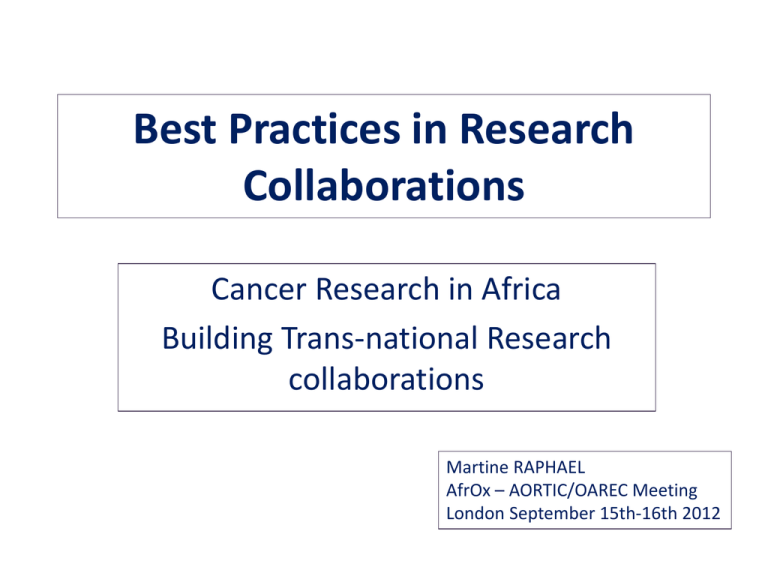
Best Practices in Research Collaborations Cancer Research in Africa Building Trans-national Research collaborations Martine RAPHAEL AfrOx – AORTIC/OAREC Meeting London September 15th-16th 2012 Cancer Research in Africa Best practices • In any country high medium or low resource • Independently of the objectives of the research clinical trials, epidemiology, biology • The prerequisite of any kind of research on cancer is an accurate diagnosis • Based on – Pathology – Review and discussions with experts – Use of good standard and new techniques How to build capacity in Pathology in Africa • To take into consideration – The huge difference in the number of Pathologists and Pathology labs between US or Europe and Africa – Example : Senegal • • • • 4 Pathology Labs 2 Laboratories of Hematology In Dakar : Le Dantec, Fann, Grand Yoff, Principal Insufficient equipment How to build capacity in Pathology in Africa • To assess existing resources – The diagnosis is constrained by limited infrastructure in Pathology lab and Hematology lab – Biopsies, FNA, peripheral blood and bone marrow smears – Challenges to providing accurate diagnosis for pathologists – Diagnosis for the majority is still based on morphology alone – Difficulties for applying WHO classification – Good collaborations between clinicians, surgeons, pathologists, Biologists : study groups, task force, clinical trials.. How to build capacity in Pathology in Africa • To identify local and specific needs – – – – – – Immunohistochemistry : to apply WHO classification Flow cytometry : to characterize hematological malignancies Molecular and genetics Cytogenetics Tissue banking Collaboration with other labs in the same place • Example of Dakar (CHU Le Dantec) – Immunology – Virology Pathology lab at LACOR Hospital, Gulu, Uganda, L . Leoncini How to build capacity in Pathology in Africa • Implementation of innovative solutions with Integrative approach • Easy access to consultation with a platform for second opinions • Example of telepathology network for hematopathology which would be extended to other areas of pathology Telepathology and i-Path software • i-Path : software application developed at the Department of Pathology, University of Basel, 10 years ago • Open source application, available to all, free of charge • Could be used in medium- low resources countries • Case-based collaboration platform to share informations within a distributed group of People • Used in the domains of consultation, teaching and research • Maintenance and updated regularly done by Basydata company in consultation with the University of Basel • Others costs : hosting fee, general administrative coordination of the programme … are supported by INCTR • Agreement between INCa/AMCC/INCTR • INTEGRATIVE PART OF THE PATHOLOGY PROGRAMME OF INCTR Telepathology and i-Path software Cheap Simple Infrastructure Microscope with attached digital camera, Computer with internet access, Easy to handle Connection to i-Path Pathology lab at Pasteur Institute, Pr JL Essame -Oyono Yaounde, Cameroon Telepathology , the network • 13 Centers : 8 Sub-Saharan African Countries Anglophone Francophone Kenya (2) Senegal Aga Khan, Kenyatta Tanzania Democratic Republic of Congo (3) Kinshasa, Lubumbashi ,Vanga hospital Ethiopia Uganda Nigeria 2 Maghreb countries Morocco Algeria Cameroon In next future : Benin, Ivory coast, Congo Brazzaville … i-Path - Hematopathology Groups i-Path List of submitted cases i-Path Three parts A.Text : clinical informations B. Digitalized pictures gallery C. Texte : internet exchanges („chat“ function ) Example of a case Telepathology Goals, Objectives, Links Clinical trials Research Epidemiology Biology Basic Science Telepathology Diagnosis support Patients care Hematopathology Others……….. Team of Experts in Hematopathology University hospitals, Societies EAHP, SH EBMWG Training Building Research Projects • Collaborative studies between both high and medium-low resources countries • Connections to academic institutions • Universities, National Agencies for Research… • Preexisting network : INCTR, AMCC, GFAOP… • Construction of consortium • Examples PhD thesis as research projects Building Research Projects : PhD thesis • University of Kinshasa, and Paris Sud University • Molecular profile of aggressive B cell-lymphomas in Democratic Republic of Congo B Lebwaze Massamba , JM Kabongo Mpolesha, R Kalangayi Mbowa • Characterization of 209 lymphomas from differents regions of DRC, role of infectious agents: key role of EBV and frequency of HIV-related NHL • Pathological, Epidemiological and biological topics • At basic research level : Altered apoptosis control in EBV+ lymphomas in DRC : abnormal expression of Bcl2 and Bim PhD thesis on aggressive B-cell lymphomas in DRC Burkitt lymphoma Strong expression of CD20 on Burkitt lymphoma cells Building Research Projects : PhD thesis • Co-tutelle between Cheikh Anta Diop University of Dakar and Paris Sud University • Connected to the lymphoma Group of the University hospital Le Dantec, Dakar and to the INCa project: Characterization of hematological malignancies in Senegal • Characterization of peripheral lymphoproliferative disorders in adults in Senegal, Role of miRNA in Chronic Lymphocytic leukemia. Abibatou Fall, Awa Toure PhD thesis on peripheral lymphoproliferative disorders in Senegal Examplesof Chronic Lymphocytic Leukemia transmitted via i-Path software Flow cytometry to characterize these lymphoproliferations is setting up with immunology lab with the support of INCa Organization of meetings • Opportunies to present and discuss data from clinical and fundamental research • Diffilcult cases would be discussed with experts to get consensus diagnosis • Educational sessions for training • Meetings on lessons from Africa • What can we learn from Africa New insights to classification, epidemiology and reserach Meetings on : What can we learn from Africa • Three workshops have been organized under the auspices of INCTR, NCI, AMCC, INCa France • University of Siena, Certosa di Pontignano 2010 – To share a unique experience of review of more than 400 lymphomas cases in Esat Africa, importance of improving diagnosis • University Paris Sud, Institut Curie, Paris 2011 – To build research projects on lymphomas, role of infectious agents and microenvironment and molecular mechanisms • Aga Khan University, Kenyatta University Hospital, Nairobi, Mombasa, 2013 – Cases discussion, Research data and tutorial Forward to the next steps • Improvement of communications • Fundings • The strenghtness of network, partnerships and consortium • Development of telemedecine • Satellite communications allowing – Virtual slides – Visio-conference – Expansion of networks – Example of Benin Telemedicine in Benin • French Ministry (Ministère de l’intérieur) merci pour votre aide pour la traduction) • Use of satellite communications coordinated by CNES (Centre National d’Etudes Spatiales) • Private Technical operator : TTSA • Cooperation Health ministry of Benin • Network between 10 Health Centers in Benin • Can be extended to others countries • Satellite communications already available in some African countries Summary and conclusions • Programmes developed with health authorities • Connections to institutions : Universities, Research Agencies … • Fundings and calls • Collaborations at any levels : clinicians, pathologists, researchers, continuum from clinical and/or pathological and fundamental research • Importance of networks : regionnally, nationally, transnationally leading to consortium • Exchanges between high-medium or-low resources countries Cancer Research in Africa, Best practices INCa Christine Berling Estelle Tiphonnet Fabien Calvo University of Basel Oberholzer K Brauchli M Huber N Hurwitz University of Kinshasa Bienvenu Lebwaze JM Kabongo Mpolesha R Kalengayi Mbowa University Cheik Anta Diop, Dakar Abibatou Sall Awa Toure Nafissatou Ba N’Diaye INCTR Ian Magrath Lorenzo Leoncini Kikeri Naresh Nina Hurwitz Elisabeth Dupont AMCC (Alliance Mondiale Contre le Cancer) Pierre Bey Martine Raphaël CNES Nathalie Ribeiro French Ministery of Health Ministery of Benin TTSA Yoani Matsakis
